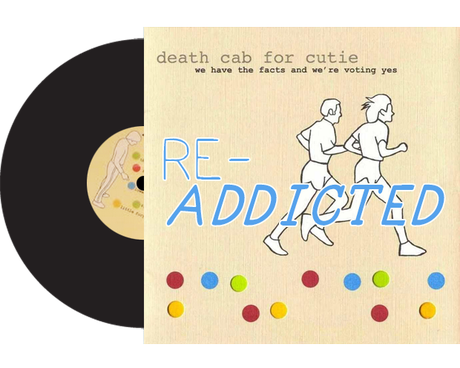
Everybody has that band. The band they listen to when they’re happy, sad, bored, driving, sleeping, taking a bath. For me, Death Cab for Cutie is that band. Ever since Seth Cohen introduced me to the quartet, who also originate from my hometown of Bellingham, Washington, they’ve been my number one. Their discography is a mixture of both sad and upbeat sounds, and over the years, they’ve evolved from pure and simple indie rock to a more complicated form of the genre that sends Ben Gibbard all over the stage during their kickass live shows. Because their latest releases are so great, and the middle of their discography, namely Plans and Transatlanticism, are their most well-known, their earlier work fails to receive the appreciation it deserves.
My re-addiction is to a hidden gem in the DCFC library, the 2001 release We Have the Facts and We’re Voting Yes.
Watch grown up Death Cab play a track from We Have the Facts below!

It’s distinctly Death Cab.
Death Cab for Cutie are indie rock pioneers for a reason: they’re really good at what they do. Some of their key attributes include story songs, great metaphors, guitar driven tempos, repetitive drumbeats and hazy nostalgia. Their newer albums, while still containing these essentials, lack the original stripped-down quality. This album and the others preceding it represent the building blocks of their talent. As a writer, I envy Gibbard’s uncanny ability to show instead of tell.
Many of the songs are stories from their most formative times—“Employment Pages” is inspired by the band’s move from Bellingham to Seattle; “405” tells of a member’s visits to Eastern Washington with a college girlfriend. If you want to discover pure Death Cab, their early discography is where you’ll find it.
It’s a concept album.
As shown by his abundance of metaphors, Gibbard’s songwriting is incredibly clever. This album is the perfect example of the band’s ability to sneakily create a masterpiece. We Have the Facts is a concept album about the demise of a relationship. From rocky beginnings in “Title Track”, to drunken summers in “405” and a sad wedding in “Company Calls Epilogue”, each song is a snapshot of young love gone sour.
It signifies a pivotal point in their growth.
This album is incredibly solid. Their first two releases, You Can Play These Songs With Chords and Something About Airplanes, while also fantastic, are less accessible. In my opinion, We Have the Facts stands as the most cohesive Death Cab album to date. Echoes of it can be seen in the rest of their discography: The rolling drum beats and nostalgia in The Photo Album, summer stories in Plans, heartbreak in Transatlanticism. If someone wanted to really know Death Cab, I would tell them to put this CD in their car stereo and listen to it from start to finish five or six (or more) times.

Following the success of Death Cab, Gibbard has taken his talent all over the map, most recently resuscitating The Postal Service to the delight of many (including me). And luckily for us, Death Cab is far from over. This September, the band will be playing Transatlanticism in its entirety at Bumbershoot Music Festival in celebration of the 10th anniversary of its release.

The Postal Service
Although an entirely different sound, Gibbard’s extremely successful side project showcases the relatable songwriting in We Have the Facts.
Kurt Vile
Deep lyrics and whiny but pretty guitars abound in this Philadelphia rocker’s music. Much like We Have the Facts, Vile’s new album Wakin on a Pretty Daze is perfect for hazy summer days and long drives.
Ra Ra Riot
I first discovered this fellow Barsuk label band when they opened for Death Cab in my hometown. Their early discography has a similar quiet-and-loud-at-the-same-time sound.
The National
These Brooklyn songwriters sit alongside Gibbard in the royalty of musicians who write metaphorical lyrics that will make you really sad. All of their albums are worth lots of listens.
Dog & Panther
This Michigan band has a similar high-pitched sound to Gibbard, with the added bonus of electronics.
Us on Roofs
Another Seattle quartet, Us on Roofs weaves together story, Washington state imagery and addictive electric guitar, resulting in indie rock goodness.

